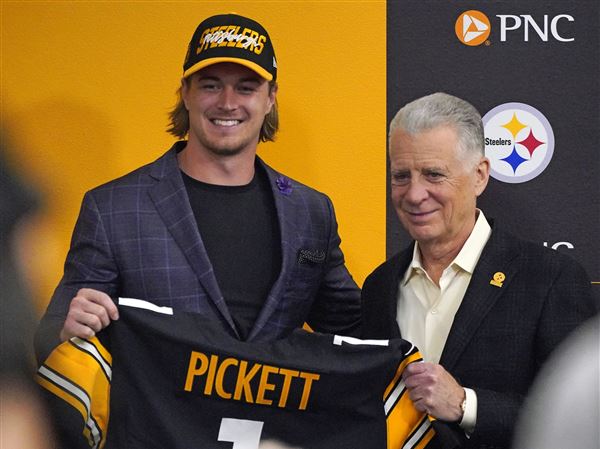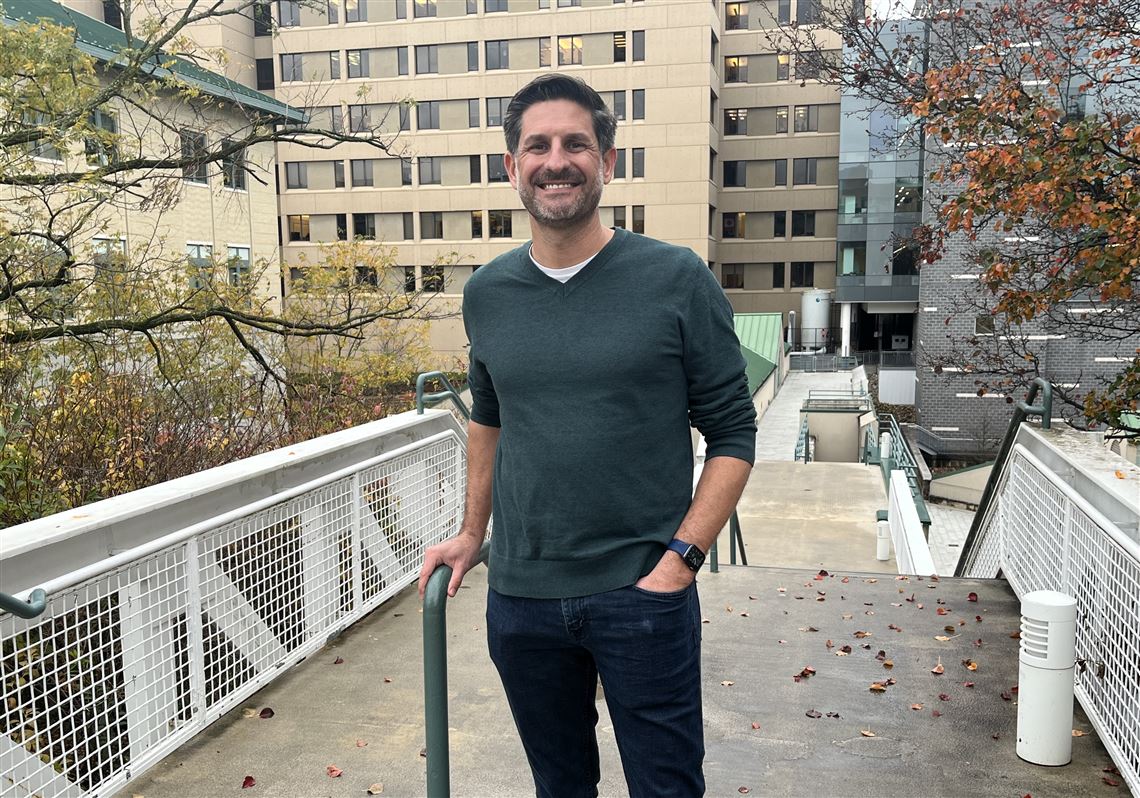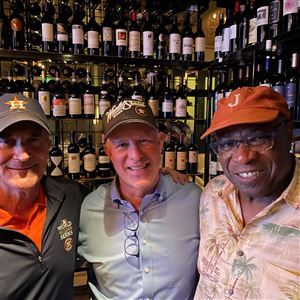BUFFALO, N.Y. — Although Doug Fearing is not a Pittsburgh native, his affinity for the city is easy to detect. It’s where he met his wife. It’s also where he bought his first winter coat and where he likes to return and visit local eateries such as Pamela’s, Primanti Bros. and Mad Mex.
More important when it comes to the ongoing analytics boom happening across professional sports, Pittsburgh is also where Fearing — a Carnegie Mellon graduate — began a fascinating career that has led to the creation of Zelus Analytics, a company changing how teams integrate data and science into their pursuit of winning games.
“Carnegie Mellon really shaped my passion for hard problems, research and working with talented people on those types of questions,” Fearing said last week during an on-campus interview with the Post-Gazette, seated at an outside table across from Tepper Quad. “It started here, but that has been a continual focus throughout my life.”
The focus for Fearing these days is an impactful one — and not just because there are reasons to suspect that it could involve a few local teams.
What Zelus does has changed the longtime model in professional sports, where teams to varying degrees have hired and honed their own analytics staffs, some focusing less on the practice, others creating groups that could run dozens deep.
Fearing’s professional sports background fits with the latter. And its roots can be traced to CMU, where he arrived in 1995 sight-unseen, freezing because he’d wear shorts year-round while growing up outside of Los Angeles.
“That was a bit of a shock,” Fearing said, laughing.
Physics was Fearing’s original intended major. He also considered biology and math before settling on computer science, crediting CMU professors Mark Stehlik and Frank Pfenning for their acceptance and guidance when it came to things like academic research, programming languages and building out software.
Fearing was at CMU from 1995-99. After five years spent working in software for a company called Trilogy, Fearing earned his PhD in Operations Research from the Massachusetts Institute of Technology in 2010.
That same year, he accepted a job as a research advisor with the Tampa Bay Rays, one facilitated by a couple of MIT and analytics heavy hitters in Steve Graves and Darryl Morey, the latter a co-founder of the renowned MIT Sloan Sports Analytics Conference and the current president of basketball operations for the Philadelphia 76ers.
“This,” Fearing said while serving as the keynote speaker at Carnegie Mellon’s own Sports Analytics Conference this past Saturday, “was not the path I was destined to be on.”
‘Changing the game’
Change has been a constant for Fearing dating back to that first foray onto CMU’s campus. One funny-not-funny joke he likes to tell is that his son had accumulated 13 addresses by his 13th birthday.
“We’re unfortunately very good at moving,” Fearing said.
That’s important because all those moves were ultimately part of what led Fearing to help create Zelus, to merge the grind of working for a team with the excitement of sports and an academic environment.
After nearly five years working for one of MLB’s most cutting-edge franchises, Fearing followed former Tampa Bay general manager Andrew Friedman to Los Angeles, where Fearing was tasked with building and leading the Dodgers’ robust research and development department.
The experience had considerable upside. Los Angeles won a bunch of games, culminating with World Series appearances in 2017 and 2018, and Fearing felt a part of the action in a way that’s tough to quantify or explain. It also came amid some tough times personally.
Death and illness in Fearing’s family in 2017 forced him to recalibrate some of his priorities. And by the time the 2018 Winter Meetings rolled around, Fearing was pitching the idea of Zelus to other teams.
The company was eventually co-founded with Luke Bornn, someone Fearing met while later teaching at MIT.
“Doug is someone who has gone off, in very true Carnegie Mellon fashion, and built something that’s changing the game,” said Rebecca Nugent, who’s the head of CMU’s statistics and data science department. “There’s not a day that passes that I’m not hearing great things about Zelus Analytics.”
The Zelus model
In addition to assembling their own research and analytics-based staffs, many professional sports teams do subscribe to a third-party service, either for bias confirmation or as a different way to supply information to coaches, players and decision makers.
Zelus takes this model and turns it on its head.
Consulting for every team is what Fearing described as a “zero sum approach,” since they’d all have access to the same data, so Zelus is selective about the teams with which it works.
There’s one per division in MLB — six total. Three per conference in the NBA, again six total. And two so far in hockey, with the desire to eventually have one or two per division. Zelus dabbles in soccer and cricket and is poised to expand to the NFL in 2023.
“Our general sense is that working with 20-25% of the league is a good balance on that cost-sharing versus competitive advantage curve,” Fearing said.
This model works, Fearing believes, because it helps to preserve that competitive advantage while affording Zelus the financial fortitude to recruit and pay its highly decorated staff, which has grown to more than 50 people — most on the technical side doing such things as data science and engineering — spanning eight countries.
“We wanted to create an environment to be able to solve those challenging problems that often don’t get solved by teams because there isn’t the right mix of capacity and capability and focus,” Fearing said.
The team setting felt restrictive to Fearing. It became more about day-to-day tasks such as wins and roster management than personal fulfillment or tackling big-picture challenges.
Zelus will always remain an academic-based space, Fearing insisted, while simultaneously affording employees the opportunity to stick with sports by working remotely.
Fearing and Bornn officially registered the company in February 2019 and hired its first employees that fall. In Fearing's mind, the blend of sports and ideas should cross-pollinate across leagues.
Meanwhile, teams that contract with Zelus can build a complex analytics model, tugging at experts in several fields, for a fraction of what it would cost to assemble and pay those staffs.
“You don’t have to have 40 people,” Fearing said. “We can build some of the foundational capacities in a structured way, so teams can search for other advantages and new sources of data.”
While speaking in vague terms to protect proprietary information, some of the things Fearing and Zelus will tackle for clients include the examination of various game states and what might cause a shift; value attributions tied to specific events; player projections based on injury and talent; and tools to better inform decision making when it comes to trades, free agency, drafts or in-game strategy.
‘A new standard’
With whom Zelus works — like most things when sports and math converge — can be tricky. The analytics world — where even the slightest advantage is precious — is often shroud in secrecy. The Pirates have about 20-25 staffers who have hands in research and development and player valuation, while the Penguins list three staffers in charge of “data science and engineering.”
Fearing would neither confirm nor deny whether Zelus worked with the Penguins or Pirates, saying it would be up to the individual teams, but there are some interesting clues here:
• The primary funder in Zelus is RedBird Capital, which in March 2021 poured $750 million into Fenway Sports Group, the group that now owns the Penguins. Two of Zelus' clients on the cricket and soccer sides are RedBird-funded teams.
• In a May 2021 story, the Athletic reported (citing anonymous executives) that two of Zelus’ six MLB slots were open, with no NL Central partner known. Fearing's time with the Rays also came when manager Derek Shelton was Tampa's hitting coach.
• Pirates general manager Ben Cherington, who declined comment from the Post-Gazette, attended CMU’s Sports Analytics Conference along with several members of the team’s research and development department. The Pirates contingent chatted with Fearing during the mid-day break.
• Fearing also stuck around in Pittsburgh for a few additional days because it’s where his football and hockey groups picked to have their fall meetings, piggybacking off the CMU conference.
If there did happen to be a formal relationship with either team, the feeling for Pittsburgh sports fans should be overwhelmingly positive. Fearing and Zelus have built a highly respected company in only a few short years, one that’s positioned well to grapple with the ever-involving analytics boom.
In less than an hour while discussing the rapidly changing industry, Fearing touched on the proliferation of kinematic data in baseball, as well as how computer vision technology in baseball has changed the way analysts look at such things as pitchers’ deliveries, the deception created and how it affects what and where they throw.
It’s all sorting through a mountain of data, information that could be cumbersome for those with smaller staff, and also highly specialized descriptors of performance that only increase the margin for error.
At Zelus — which Fearing joked came from available URLs and the Greek god of rivalry (the inherent competition in sports) and jealousy (a nod to the exclusivity model) — the company is uniquely positioned to address those concerns with an academic approach and some of the brightest stars in the industry.
“It’s definitely a new standard in sports analytics opportunities,” said Ron Yurko, an assistant teaching professor at CMU.
“Everybody wants to work for Zelus,” Nugent added. “They’re scooping up talent left and right, and they’re doing it while creating a supportive atmosphere, one where they care about people and the quality of work. Hats off to them for having that vision.”
Jason Mackey: jmackey@post-gazette.com and Twitter @JMackeyPG.
First Published: November 7, 2022, 11:00 a.m.
Updated: November 7, 2022, 11:10 a.m.


















